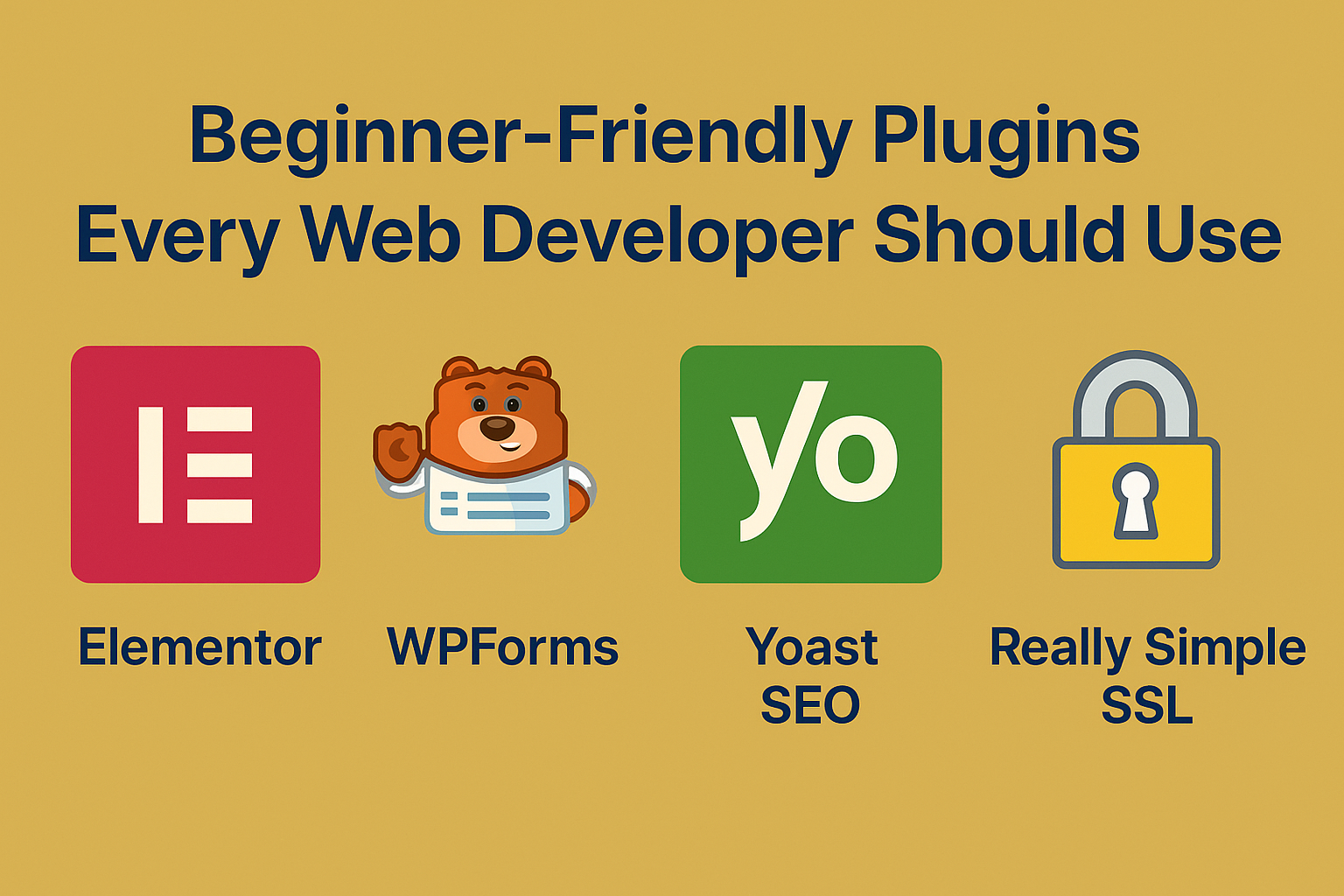Starting out in web development can feel overwhelming, especially when you’re trying to figure out what tools you actually need. The good news? You don’t have to learn everything at once. By using the right beginner-friendly plugins, you can speed up your workflow, avoid common mistakes, and focus more on building and learning.
This guide is designed to help absolute beginners—whether you’re creating your first website with WordPress, learning HTML/CSS, or experimenting with simple page builders. Here are some of the most essential, easy-to-use plugins every new web developer should consider.
What Makes a Plugin Beginner-Friendly?
Beginner-friendly plugins typically:
-
Require little or no coding
-
Have intuitive user interfaces
-
Offer built-in tutorials or documentation
-
Solve common beginner problems like forms, layout design, or SEO
-
Are compatible with popular platforms like WordPress or website builders
Let’s explore plugins that check all those boxes.
1. Elementor (WordPress Page Builder)
-
What it does: A drag-and-drop page builder for WordPress
-
Why it’s beginner-friendly: You can design beautiful websites without writing a single line of code.
-
Use case: Build custom pages, sections, headers, and landing pages visually.
-
Bonus: Comes with free templates to get started instantly.
If you’re using WordPress, Elementor is hands down the easiest way to build pages.
2. WPForms (WordPress Contact Form Plugin)
-
What it does: Lets you create contact forms, surveys, and signup forms using drag-and-drop.
-
Why it’s beginner-friendly: No coding knowledge required. Just drag fields into your form layout.
-
Use case: Add a “Contact Us” form to your website in minutes.
Ideal for beginners who need basic functionality like user interaction or email collection.
3. Yoast SEO (WordPress SEO Plugin)
-
What it does: Helps improve your website’s SEO with real-time suggestions.
-
Why it’s beginner-friendly: Easy-to-understand indicators (green, orange, red) tell you how well your page is optimized.
-
Use case: Write blog posts that rank better on Google, with guidance for titles, meta descriptions, and keyword usage.
Even if you don’t fully understand SEO yet, Yoast will guide you step-by-step.
4. Really Simple SSL
-
What it does: Automatically detects and configures SSL (HTTPS) for your WordPress site.
-
Why it’s beginner-friendly: It requires one click to activate SSL—no manual configuration.
-
Use case: Secures your website and prevents the “Not Secure” warning in browsers.
Security is critical, and this plugin makes it simple for anyone to implement SSL.
5. Classic Editor (WordPress)
-
What it does: Reverts the WordPress editor back to the classic editing style.
-
Why it’s beginner-friendly: Some users find the block-based Gutenberg editor confusing—this restores a simpler experience.
-
Use case: Edit posts and pages in a way that’s more familiar and less technical.
If you’re new to WordPress, the Classic Editor can make writing and editing feel more like using a regular word processor.
6. Smush (Image Optimization)
-
What it does: Compresses and resizes images automatically to improve site performance.
-
Why it’s beginner-friendly: Runs in the background—just install it and your images are optimized automatically.
-
Use case: Faster website loading with no quality loss in images.
Great for non-tech users who upload lots of visuals and want their site to load quickly.
7. SiteGround Security or Wordfence (Basic Security Plugin)
-
What they do: Add firewalls, login protection, and malware scanning to WordPress.
-
Why they’re beginner-friendly: Simple setup wizards make it easy to secure your site with default settings.
-
Use case: Prevent brute-force attacks and protect your admin dashboard.
Website security is often overlooked by beginners, but these plugins make it easy to lock things down.
8. Starter Templates (by Astra)
-
What it does: Gives you ready-to-import website templates for WordPress.
-
Why it’s beginner-friendly: You don’t need to design from scratch—just import a full website and edit the content.
-
Use case: Build professional-looking sites with almost no setup.
A perfect choice if you’re starting a blog, business site, or personal portfolio.
Bonus: Tools for Absolute Non-Coders
If you’re not using WordPress and working with website builders like Wix or Squarespace, you may not need plugins—but here are two super simple web-based tools you should know:
a. Canva Button Generator
-
Lets you design CTA buttons and export them for websites.
b. TinyPNG
-
Compresses images with a drag-and-drop interface to make your site faster.
Final Thoughts
Plugins are powerful allies for beginner web developers. They eliminate technical roadblocks and let you focus on learning, creating, and publishing without getting stuck in the complexity of code.
If you’re just starting out:
-
Use Elementor for design,
-
WPForms for basic forms,
-
Yoast SEO for search visibility,
-
And Smush or TinyPNG for performance.
These plugins will give you the confidence and functionality to start building real websites, even with little or no programming knowledge.
Looking to launch your first website or refine your web development skills?
At Space Creative Agency, we specialize in helping individuals and businesses turn their digital ideas into fully functional, high-performing websites. Whether you need guidance, hands-on development, or performance audits, we’ve got you covered.
Call us today at 608-217-8434 to take your next step in the digital world.

